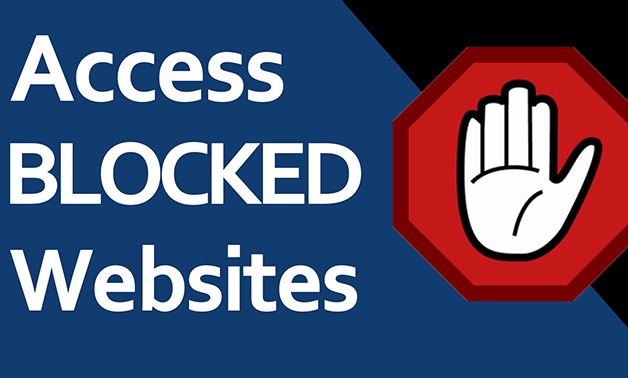
Blocked websites- photo via youtube
CAIRO- 22 May 2017: A total of 21 websites have been blocked in Egypt, including Qatar’s Aljazeera, because they publish content that “supports terrorism and deliberately spreads lies.”
Since Wednesday evening, Egyptians have not been able to access pro-Islamists news websites and other venues such as Masr al-Arabia, Arabi 21, Al-Sharq, Klmty, al-Horria Post, Hasam Egypt, Ikhwan Online, Rassd, Cairo Portal, Egypt Window, as well as the website of Palestinian group Hamas.
Aljazeera and several Qatari news websites, such as Al-Arab and Al-Watan, have also been blocked in Saudi Arabia, United Arab Emirates, in addition to the Egyptian pro-Muslim Brotherhood website Rassd. The action from the Gulf states come after a statement that attacked them was attributed to Qatari Emir Tamim bin Hamad Al Thani.
A governmental report obtained by Egypt Today revealed the measures taken by countries around the world regarding the internet to protect national security. The report warned that the vast majority of hacks happened due to using IP addresses given to users by foreign websites.
A high-profile security source told Egypt Today that the blocked websites incite violence, extremism, and terrorism. He emphasized that they were the first websites to run stories about terrorist attacks in Egypt, adding that the managers of these websites belong to radical ideologies or are implementing foreign agendas to instigate instability, and receive massive support from several entities in return.
The Egyptian state has grown “impatient” with these website and the news they run to incite hatred between Muslims and Christians, encourage the youth to be recruited by terrorist groups, and perpetuate despair and frustration in the society, the source said, adding that the measure is lawful.
The world deals with mass media as an inherent pillar of national security, and Egypt is going through a “real war” against terrorism not just on the security and military levels, but also intellectually, culturally and media wise.
The report said it is perfectly legal to block websites without infringing on personal lives in order to prevent terrorism and prejudice to “traditions and principles.”
In April, Turkey blocked Wikipedia because it links Ankara to terrorism, citing a law that bans access to obscene website or online venues that pose a threat to national security. The country blocked Facebook, Youtube and Whatsapp in the aftermath of the botched coup of 2016, the report was keen to mention.
Saudi Arabia has blocked over 600,000 pornographic website in the past two years,
And UAE previously blocked Whatsapp and Viber, but most importantly, it jails and fines those who change their IPs to access banned websites.
The report happily mentioned Egypt is still not one in the list of the top 10 internet censors; rather, the list includes Tunisia, whose internet service providers must report the IP addresses and personal information of all bloggers to the government. Hence, all traffic goes through a central network and the government can filter all content uploaded and monitor emails.
Although other countries do not face the scale of challenges faced in Egypt, they have decided to block websites for various reasons, such as China, Syria, Iran, Ethiopia, Uzbekistan, Cuba, Vietnam, Saudi Arabia, Bahrain and Pakistan, according to the report.
Reasons vary from terrorism, prostitution, illegal immigration, and money laundry.
The EU decided to monitor websites to counter terrorism and detect websites that promote systematic violence, and it “admitted” after the Paris attacks that it is necessary to protect the borders of the EU by further control over the internet, and some websites used to recruit European youth to fight in Syria have been blocked, the report said.
In March 2015, France removed certain websites from the search results without judicial supervision, including content abusive to children and website that incite terrorism or condone it, the report added.
It also cited that the U.K. spies legally in a program that has cost millions of dollars from 2009 and stores online activities of users.
Germany blocked a rightist websites for publishing content that promoted hatred against Jews and Muslims and the LGBT community.
The report mentioned U.S. intelligence-developed Xkeyscore program, revealed by Edward Snowden, and emphasized it tracked what an internet user does on social media, the browsing history and worked Linux server Red Hat and also on Apache and saved data on MySQL.
It quoted Pentagon spokesman Lt. Col. Damien Pickart in 2013 that any website that would “post information the department deems classified” will have that content “filtered,” hence will be “inaccessible from Department of Defense networks so long as it remains classified.”
The Egyptian report brought up more examples from China that has blocked Facebook since 2009 because it promotes revolutions and because of its privacy policy.
Iran blocked Facebook and Twitter in 2009 following protests during the presidential elections, and it blocked Instagram in 2013.
In 2012, Pakistan blocked Youtube because it refused to remove an anti-Islam video, and Twitter has been blocked for similar reasons several times, but both Twitter and Facebook have accepted demands by the Pakistani government.
Vietnam has unblocked Facebook but banned sharing anti-government stories or private information, while Eritrea blocks Youtube and closely monitors the internet.
The report continued to cite internet censorship in Thailand, Tajikistan, North Korea and Bangladesh.

Comments
Leave a Comment